Inside the NYU EMBA Global Study Tour to Vietnam

Global study trips are one of the most valuable opportunities available to MBAs. It can provide students with the chance to experience different business practices, learn from companies across the world, and better understand the global marketplace. It’s a beneficial learning environment for students in any industry and job function.
At the NYU Stern School of Business, the most recent Global Study Tour took a group of Executive MBA students to Ho Chi Minh City, Vietnam. During the trip, students met with representatives from a wide range of companies including Vina Capital, Grab, AstraZeneca, Siemens, Esquel Group, and more. Don’t worry; they also had plenty of time to sightseeing and eat the local food.
To learn more about this most recent Global Study Tour to Vietnam, we spoke with Anjou Martinez, an ’18 EMBA student, who was on the trip.
MetroMBA: What was the highlight of the trip for you?
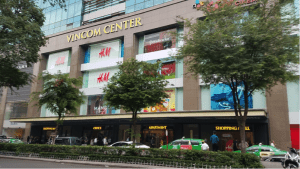
Vincom Center
Anjou Martinez: The best part of the trip for me was the Local Market Immersion, where each group was assigned a tour guide/interpreter and was given an itinerary to visit a variety of local places to observe the daily life in Ho Chi Minh. My group was tasked to visit Vincom Center, a high-end shopping mall equipped with residential and office space. At lunch, we sampled traditional Vietnamese cuisines such as Bun Bo Hue, a traditional Hue-style beef noodle soup, Xu Chicken Rice, a crispy chicken dish with ginger chili soy sauce and aromatic rice, and Sautéed Vermicelli Noodles with vegetables.

Ben Thanh Market
After lunch, we walked to the famous Ben Thanh Market, an indoor marketplace that sells local handicrafts, branded goods, and souvenirs at inexpensive prices. In this setting, prices are not fixed, so you have to haggle to find a bargain. We also visited Phuong Ha, a specialty grocery store for expats and more affluent locals. Most of the goods were manufactured from the U.S., Europe, and Australia.
On our way to our last stop, which was Maybank, we added a side trip to the Bitexco Financial Tower, which is the tallest skyscraper in Saigon. We ended our immersion at the bank, which was closed by the time we arrived—it closed at 3 p.m., which we thought was early compared to U.S. standards.
Metro: What company visit had the greatest impact on you and why?
AM: My favorite company visit was at Doan Potters, a private company in Binh Duong province which exports its pottery and home décor products to big companies such as Wal-Mart, Home Depot, Lowe’s, Crate & Barrel, and Pier 1 Imports. The management was very accommodating. They broke us into groups and assigned us an expert to tour their facilities and better understand their business from converting the raw materials into clay, designing, slip-casting, jiggering, hand-turning, glazing, carving, and firing. This experience showed me how small businesses in Vietnam can thrive, make an impact in their community, and profit globally.
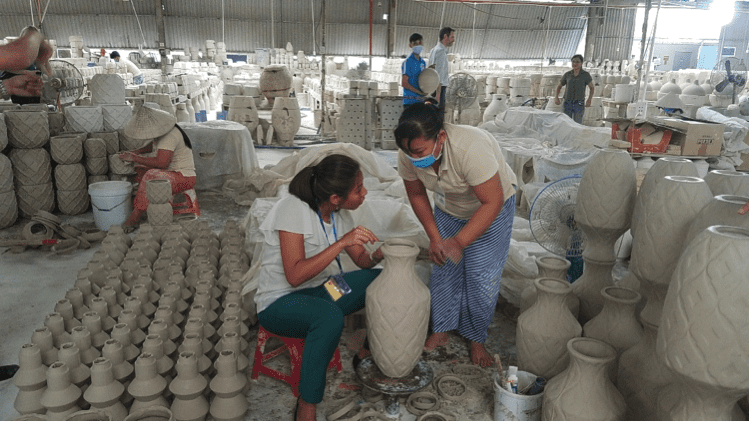
Doan Potters
Metro: Can you share one of your funniest situations or experiences in Vietnam?
AM: The most unique experience I had in Vietnam was after class, when several of us rode on the back of a scooter driven by our personal driver/guide to explore the bustling streets of Saigon while making food stops at local eateries. It was exhilarating to go with the traffic flow with no clear driving lanes and directions. We ate like the locals on low tables and low stools in a crouch position. We were on the streets with Back of the Bike Tours for most of the evening, and we ventured from District 1 to District 3 and 10. I thought it was the best way to live like a local for one night. My driver Phuong was very helpful in answering questions about her country and what it was like for her—as a recent a college graduate—to live in Saigon.
Metro: What surprised you the most about your trip?
AM: Coming into Vietnam, I thought they were a strict Communist country like China. However, I was surprised to find out that the government has done a lot of things to improve capitalism by encouraging privatization. Small- and mid-size businesses are indeed thriving in Saigon.
Metro: Why did you decide to go on the Global Study Tour to Vietnam?
AM: As part of the NYU Executive MBA program, we had an option to go to a global study tour (GST) in Vietnam or Greece. I thought a GST in Vietnam is more of an educational experience for me since I had lived in Southeast Asia when I was younger. I think Vietnam has its own charm and interesting history—so much so that I was inclined to travel more than 20 hours one-way to experience what it had to offer.
Metro: How did the trip enhance or change your view of international business?
AM: Seeing is believing. Aside from Doan Potters, we also visited Esquel Group, a global textile and apparel manufacturing company that boasts clients such as Nike, Ralph Lauren, and Tommy Hilfiger. We witnessed how shirts and pants were made from scratch from cutting, sewing, embroidery, silkscreen, laundering, and packaging. Now, when I go for a run and put on Nike apparel, I think of Esquel’s manufacturing facility and how the world is a smaller place. The East has really met the West. International business can flourish by establishing global partnerships that create win-win situations for both companies.
Metro: Why would you recommend that an MBA student travel abroad during their program?
AM: My global study tour was an eye-opening, educational experience that cannot be matched by lectures, course readings, or videos. Students must immerse themselves in the culture, language, customs and thus, business opportunities. The academic structure of the global study tour optimized the learning.
For a Career in Supply Chain Management, Head to Washington DC
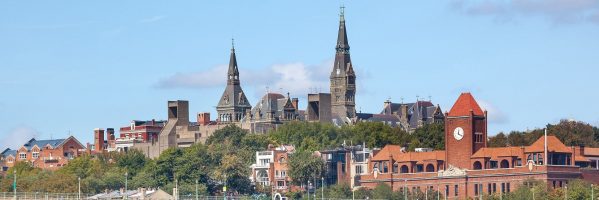
Today’s boardroom is tomorrow’s chopping block. Business is a beast, no doubt, one whose needs grow increasingly demanding and complex along with those of we, the consumers, who drive it.
To navigate let alone thrive in this hectic environment requires unprecedented strategy, analysis, and execution. For many companies navigating the unruly seas, so to speak, the great white hope is an unsung hero of sorts: the supply chain manager.
Supply chain managers, or SCMS, have long been vital to the quality and productivity of projects. In short: SCMs oversee how all the constituent parts of their product—raw materials, information, and finance—move from supplier to manufacturer to wholesaler to retailer to consumer.
There are certainly lots of moving parts to this position—no pun intended—which makes sense why supply chain management has become such a popular concentration at business schools and an increasingly in-demand gig for graduates.
When it comes to ideal places to pursue an SCM degree, it doesn’t get any better than Washington DC, a cosmopolitan, cross-sectional hub for politics, business, and tech. In addition to its strategic mid-Atlantic location, sandwiched between the business centers of the lower Midwest, the upper Southeast, and the lower Northeast, the Chocolate City is home to a wide range of industry players, offering infinite access to whichever field you aspire to enter through an SCM degree. In addition to the warm, friendly folks like Lockheed Martin and Capital One that make their home in the Beltway, startups like HireKeep, NotionTheory, and Click2Mail do as well.
For you aspiring supply chain managers out there, we did the legwork for you and took a deeper dive into four DC metro degrees.
University of Maryland’s R.H. Smith School of Business
The UMD Smith MS in Supply Chain Management is consistently ranked as one of the most innovative in the region. Whether you’re looking to become a buyer, a logistics officer, freight specialist, or key account specialist, Smith will give you the “relevant, real-world experience” needed to “drive business growth, promote efficiency, sustain the planet,” and last but not least—impress recruiters. Smith’s deep ties to Wal-Mart, Bosch Rexroth, AstraZeneca, China Mobile Cooperation, and Unilever will surely benefit Smith MBAs. All graduates become Lean Six Sigma Yellow Belt™ (ICYB™) Certified by the International Association for Six Sigma Certification (IASCC).
Howard University School of Business
The Howard University School of Business‘ Supply Chain Management (SCM) concentration was designed specifically to prepare students for “leadership roles in global corporations and government entities.” Howard’s combination of faculty, curriculum, executive sponsorship, and real world experience means that graduates are well-equipped to meet the demands of an increasingly competitive job market.
CHECK THIS OUT: What Are The Differences Between The World’s Best Online MBA Programs?
Georgetown’s McDonough School of Business
Operations and Information Management (OPIM) concentration at Georgetown University’s McDonough School of Business is an interdisciplinary effort that combines Production and Operations Management, Operations Research/Management Science, Statistics/Decision Analysis, and IT/Systems Management. OPIM was designed to create opportunities for research and employment within information systems that support decision processes, risk management, business analytics, and global operations.
George Mason University School of Business
The George Mason University School of Business offers a Project Management concentration that might appeal to MBA candidates with an interest in supply chain. The Project Management concentration—available both online and on-campus—was designed to give MBA candidates the “knowledge and skills needed to manage major projects from conception to implementation.”
The 5 Best Dallas Executive MBA Programs
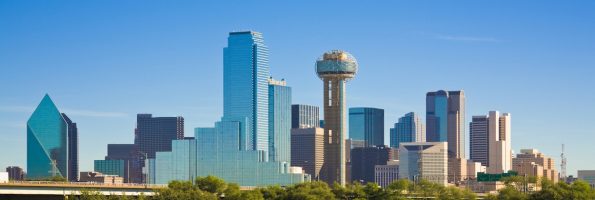
In the world of business, the Executive MBA degree is akin to an Iron Man decathlon in which one simultaneously attempts work, life, and school with equal gusto.
Designed to reskill and get mid-career professionals up to speed on the latest management trends, the value of an EMBA as a useful negotiation tool is undisputed—especially if you can get an employer to fit the bill. If not, it’ll cost you but the investment is one that will certainly go a long way to paving a future leadership position way up the corporate ladder.
And when it comes to corporate ladders, the greater Dallas metro area has got an embarrassment of riches. The region is HQ to Exxon Mobil, AT&T, American Airlines, Southwest, Texas Instruments, JC Penney, and Gamestop, among many others on the 2017 Fortune 500. You could also do a lot worse with the area’s cultural offerings, especially if you like football, art, and authentic Tex-Mex.
Let’s take a closer look at five best Dallas Executive MBA programs:
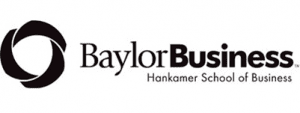
Baylor’s Hankamer School of Business
The Baylor Hankamer School of Business 48-credit, 21-month, $91,000 EMBA is designed for mid-level executives. The program emphasizes leadership skills, decision-making, human resource management, global strategic management, and contemporary business issues within a cohort lock-step structure. The 50-credit, $94,000 EMBA Healthcare curriculum does the same but specifically tailored to the healthcare sector. EMBA students arrive from a variety of companies, including Apple, AT&T, Xerox, Wells Fargo, Microsoft, Coca-Cola, Wal-Mart, and American Airlines. The EMBA does not require GMAT or GRE scores but applicants must have at least five years of work experience.

Southern Methodist’s Cox School of Business
The SMU Cox 21-month, $120,150 part-time EMBA prepares experienced business leaders to take their career to the next level by helping them move into higher executive level positions or to expand their company’s reach. The EMBA emphasizes general management practices, strategy, finance within real-world applications. Applicants are expected to have at least eight years of work experience but GMAT/GRE scores are not required.
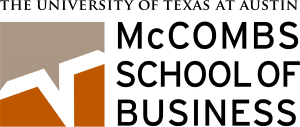
UT-Austin’s McCombs School of Business
The curriculum for McCombs School of Business 2-year, 42-credit, $116,800 EMBA is based on a cohort system in which groups of five students “encourage teamwork and development of leadership skills” among one another and each student is paired with a mentor from the previous year’s class. The EMBA covers effective communication, risk and change management and business ethics. Of the 68 students in the EMBA class of 2018, the average age is 37 and the average work experience is 14 years.
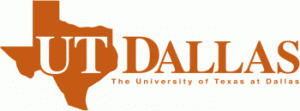
UT-Dallas’ Naveen Jindal School of Management
The UT Dallas Naveen Jindal School of Management 21-month, 53-credit, 5-semester, $85,000 EMBA was developed to prepare “experienced professionals for careers in upper management.” The cohort structure centers on “the fundamentals of business, marketplace advancement, leadership, corporate assets strategy, and data use and interpretation.” The average UT Dallas EMBA student is 40 and with an average work experience of 16 years. Applicants must have a minimum of eight years “professional business experience with international and management experience,” although GMAT or GRE scores are not required.

UT-Arlington College of Business
The UT Arlington College of Business 15-month, 37-credit, $74,500 EMBA (and accompanying Asian Business Studies certificate) is ideal for helping mid-level and upper-level managers and executives “develop the skills needed to move their company into global markets or to increase the company’s presence in a global market.” The EMBA focuses on the “skills and knowledge needed to run multinational firms, manage data, and develop effective teams that will help firms expand into global markets, maintain customer value, and build long-term customer relationships.”
Its cohort structure allows students to gain “extensive experience working collaboratively as part of a team,” which extends to the two-week Chinese immersion trip in which students develop a project specific to the region.
The average UT Arlington EMBA student is 38 with an average of 16+ years of work experience. Executive MBA students generally pay for the program through employer sponsorship, although there are scholarship and financial aid opportunities available.
Hispanic Business Student Association at Bauer Receives Top Honor
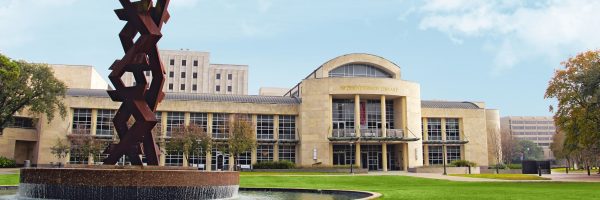
The C.T. Bauer College of Business at the University of Houston chapter of the Hispanic Business Student Association was recently honored as one of the top student chapters across the country.
Students in the Bauer chapter of HBSA recently attended the Association of Latino Professionals for America (ALPFA) convention in August, where groups from universities across the nation had gathered together in Las Vegas. Alejandra Requena, C.T. Bauer student and HBSA president in the spring, helped to coordinate a trip for 40 members to travel to the Vegas convention. It was here that the students were honored as the top HBSA chapter in the region, and one of the top four in the nation.
“I think what sets us apart is that we really care about our members and our members care about each other,” Requena said on news of the new honor. “Not only have we provided preparation for our members throughout the semester on how to build résumés, network, and develop leadership skills, but we also have members who genuinely want to help each other.”
During the convention, four Bauer HBSA members also had the opportunity to participate in a case competition sponsored by KPMG. The team, which consisted of three accounting students and one finance, was advised on their presentation by Clinical Professor Michael Newman, who helped them to take second place over all, ahead of 23 other teams.
The convention also provided students with the chance to network with business professionals, which yielded tangible results for many students. After the convention, several students walked away with full-time offers from companies like Wal-Mart, Goldman Sachs, and Deloitte.
Metro Jobs Report: Seattle Minimum Wage, Breaking Up Amazon and More

Let’s dig into the latest job news …
